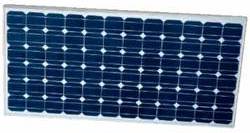GE solar panels seemed destined to become the new king of thin film solar modules.
The company had big plans to open the biggest solar panel factory in the United States. This state of the art solar facility in Colorado was going to be churning out a new solar panel every ten seconds.
Then the cost of solar panels came way down and a state of the art solar factory didn’t sound like a very profitable venture. General Electric has now announced that the company is putting its solar manufacturing plans on hold for at least 18 months.
Now that we know what GE is up to, let’s get a little background on the company’s energy offerings:
GE Energy is headquartered in Atlanta, Georgia and dabbles in many energy sources including coal, oil, gas, nuclear, water, wind, and of course solar. GE is a powerhouse in the wind industry and over 16,000 of the company’s 1.5 MW turbines are installed internationally.
So, GE is a big shot in the wind business, but what does the company bring to the solar industry?
Well, GE is committed to increasing the efficiency of thin-film solar panels and cutting costs at the same time. The company feels this is the best strategy for positioning their panels competitively.
Cadmium telluride is the thin-film solar technology that GE is hoping to take to new heights. This technology offers some potential cost savings over traditional crystalline silicon solar panels and you can learn more about the manufacturing process in this video by GE:
GE’s main competition in the thin-film market is First Solar. First Solar already has over a gigawatt of manufacturing capacity and is the established market leader.
GE plans on competing with First Solar by making solar panels that are more efficient and lightweight than any other thin-film panel available.
Solar panel efficiency refers to the amount of power a solar panel can produce from a certain amount of sunlight.

Although thin-film technologies are not as efficient as crystalline solar panels, they can still provide good value due to the fact that they are usually less expensive. GE is planning to produce cadmium telluride thin-film panels that are 14% efficient.
The average efficiency of First Solar’s panels is still under 12% and GE is hoping that the additional efficiency will differentiate the company’s panels and allow the company to charge a premium.
It makes sense that GE would want to create more efficient panels, but why does the company want its panels to also be lightweight?
Having lighter panels will provide GE solar panels with an advantage in the commercial rooftop market. A commercial building is often not designed to support much more than its existing weight load.
This can make a large solar installation impossible due to the additional weight of the solar panels. If GE can produce panels that are light enough, the company could be the ‘only game in town’ for many commercial buildings.
All this sounds good, but should I put GE solar panels on my roof?
General Electric and many other solar manufacturers are currently trying to find a place in a very volatile market. Due to this volatility, the question of whether the company’s panels are the best solar solution for your needs is a little tricky.
On the GE website, the only cadmium telluride panels listed are smaller models of 78W, 80W, and 83W. These small panels might not be ideal for larger rooftop solar installations.
The company also lists a series of larger solar panels on the website that use a different thin-film technology known as CIGS. Since the company seems to have decided to focus on developing its cadmium telluride panels, however, betting on a different technology might not be the best choice.
In the case of GE and the company’s solar panels, it might be time to sit tight and see how things shake out.
